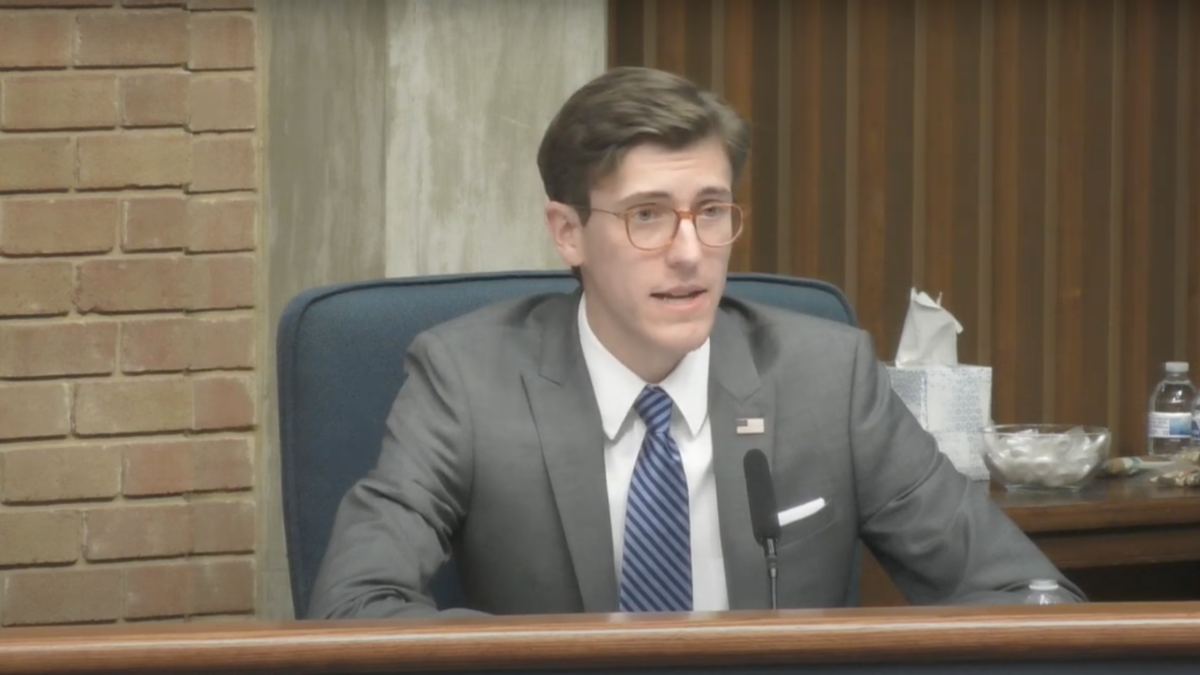According to the Brookings Institution, “There is no evidence that mail ballots increase electoral fraud.” USA Today purports to “fact check” the “False claim that mail-in voting is connected to bad actors, fraudulent ballots.” The Brennan Center for Justice informs us, “Extensive research reveals that fraud is very rare.”
While it’s important not to make claims about the existence of voter fraud you can’t prove, what’s also true is that nearly all of the analyses dismissing concerns about voter fraud and mail-in ballots rest on a logical fallacy: The absence of evidence is evidence of absence. In other words, the assumption is that voter fraud is not happening because there are very few criminal convictions related to voter fraud. Republicans, however, have long contended that those governing the areas where voter fraud is most likely to occur — Democrat-run cities with a high density of votes — have no incentive to root out and prosecute voter fraud because they benefit from it politically.
With that in mind, what just happened in the Democratic primary in Bridgeport, Connecticut is pretty incredible, and so far, a cursory search shows there’s not a single story from a national news outlet about it. Bridgeport Mayor Joe Ganim just won the Democratic primary, effectively securing his seventh term as mayor of the largest city in Connecticut. However, his Democratic opponent — John Gomes, a city employee fired by Ganim earlier this year — isn’t conceding. He claims Ganim stole the election by tampering with mail-in ballots, and he’s released video he claims proves that’s what happened.
After Election Day, Gomes was leading Ganim among votes that were cast in person. Ganim insisted that it was important to wait for the absentee and mail-in ballots to be counted, and Ganim won the absentee votes 1,545 to 779, securing a victory in the primary by 251 votes. After the initial in-person votes were counted, Ganim predicted the absentee votes would break his way. According to the Connecticut Mirror, which has been all over this story, “Gomes also made note of the outstanding absentee ballots early Tuesday evening, but in front of reporters, he questioned whether voters could trust the outcome of those ballots.”
It turns out Gomes had good reason to question the validity of the ballots, and this wasn’t some outrageous attempt to delegitimize the election. Ganim also won the 2019 primary election with a come-from-behind victory that resulted from counting absentee ballots. Media accounts surrounding that election reported the absentee ballots in that election were “rife with irregularities.”
On Aug. 30, almost four full years later, Connecticut’s State Elections Enforcement Commission recommended criminal charges for three people connected to Ganim’s campaign relating to their suspected mishandling of absentee ballots in the 2019 election.
Now John Gomes has released video that he says shows city employee Wanda Geter-Pataky, who is affiliated with the Ganim campaign, stuffing ballots into drop boxes. “State statute says absentee ballots can be returned only by the ballot applicant, their family members, police officers, local election officials or someone who is directly caring for someone who receives an absentee ballot because they are ill or physically disabled,” according to the Mirror.
Though the woman in the video looks like Geter-Pataky, her identity has not been independently confirmed. Neither Geter-Pataky nor the Ganim campaign are commenting on the allegations. However, the video is compelling enough that there’s an official police investigation. Adding to the suspicions is the fact that, yes, Geter-Pataky is one of the three people that the State Elections Enforcement Commission just recommended charges against for her handling of ballots in 2019.
That in turn prompts a pretty basic question: The State Elections Enforcement Commission opened their investigation into Ganim’s campaign in September of 2019 almost as soon as the last primary election was over, so why did it take four years to do anything about this? It’s true proper investigations take time, and according to CT Insider, “SEEC investigators were hampered by the COVID pandemic.”
However, if you’re not inclined to give Connecticut officials the benefit of the doubt, the narrative here looks awfully suspicious. National Democrats spent 2020 fanning out across the country overhauling voting laws, often through corrupt and questionable processes, using Covid as an excuse to expand the use of absentee votes and ballot harvesting. That debate continued to rage after Trump’s narrow loss to Biden in the presidential election, which hung on just 44,000 votes across three key states, and which resulted in Trump and his allies alleging the election was stolen.
Even if a great many of the voter fraud allegations being made by Trump and his allies were dubious, confirmation that elections in the largest city in Connecticut were being stolen through the use of mail-in ballots would blow a huge hole in the frankly absurd partisan narrative that “there is no evidence that mail ballots increase electoral fraud.”
If you approach what happened here with a small degree of skepticism, it looks like the State Elections Enforcement Commission sat on its hands, because it would rather let the mayor of Bridgeport possibly steal an election than have to affirm that Republicans have a point about the connection between absentee ballots and fraud. And then when they realized that this latest primary in Bridgeport was also going to be close, it would appear they rushed out a report recommending criminal indictments just over two weeks before the primary election almost a full four years later as a last-ditch attempt to ward off Ganim’s campaign from tampering with ballots for potentially a second time.
The Bridgeport allegations of voter fraud also provide a disturbing window into how this kind of fraud could occur. In the USA Today “fact check” cited above, they quote an expert assuring us that “States and localities have had mitigations in place to catch any potential cases of fraud. Those mitigations have been in place for decades and they work.” But what if the people responsible for enforcing those “mitigations” are in on the fraud?
In the video above, it’s being alleged that, in between her multiple trips to the ballot drop box, Geter-Pataky is going into a municipal building and preparing more ballots to stuff at her desk as a city employee. Here is a picture of Geter-Pataky hugging the city clerk, and while there’s no evidence that the city clerk is in on any of the wrongdoing Geter-Pataky is allegedly accused of, clearly she has inside access to resources that would make fraud easier.
It’s also worth noting that the video was leaked to the Gomes campaign, and without that, it’s hard to say whether this apparent wrongdoing would have ever been ferreted out. Now imagine this isn’t a Democratic primary in Bridgeport, let’s say it’s a presidential election in Philadelphia. In that case, do the city employees responsible for reviewing security footage of ballot dropboxes care if they see another city employee stuffing ballot boxes? Or do they just ignore it because city employees often owe their jobs to the patronage of Democratic officials and assume whatever is going on will be beneficial to them personally?
Fortunately for Connecticut officials, so far no national media outlet has picked up on the Bridgeport drama — not that this is in any way surprising. The idea that absentee ballots were more prone to fraud was common sense for decades. In 2012, The New York Times ran an article titled “Error and Fraud at Issue as Absentee Voting Rises.” Now it’s virtually impossible to find an objective assessment of the risks of ballot harvesting in the media or any coverage of the resulting voting problems.
But the silence from national media here is telling. It’s hard to imagine the parties being reversed in this story without a torrent of outrage and the press combing over every detail of this story from the jump four years ago. In 2020, a city council election in Paterson, New Jersey — a city with roughly the same population as Bridgeport — was invalidated out after 1 in 5 mail-in ballots was rejected amid accusations of fraud. Unsurprisingly, the national media paid almost no attention to that story, either.
Again, nothing here is proven yet; Ganim and his campaign may yet be cleared of this mess. However, it’s probably also not too cynical to expect overwhelming pressure to unjustly sweep this all under the rug if national scrutiny blows a hole in the Democratic Party’s absurd insistence that absentee ballots don’t contribute to voter fraud. And if the Bridgeport scandal does break through to the national media, expect the coverage to focus on “Republicans pouncing” rather than the details of the actual corruption, who’s behind it, and attempts to determine how widespread it is.
The mindless insistence that “there is no evidence that mail ballots increase electoral fraud” is assumed to help the Democratic Party win elections, and so long as that’s the case, the national press won’t let any facts about stolen elections get in the way.









